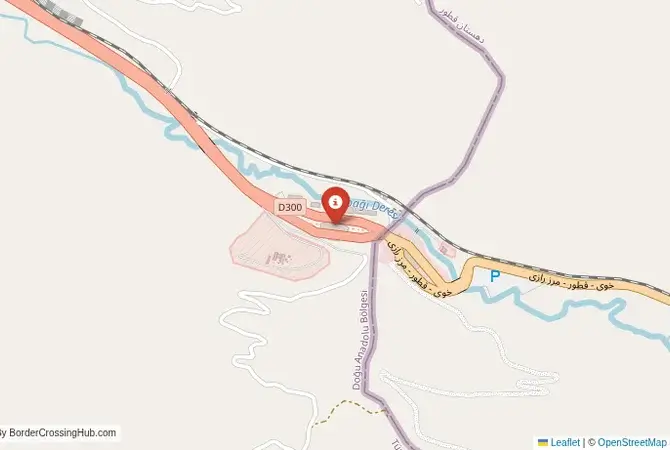
Approximate Border Location
Wait Times
15-60 min for pedestrians/vehicles
Operating Hours
Open 6:00 AM – 10:00 PM
Crossing Types
Pedestrians, vehicles
Border Type
Land crossing via road
Peak Times
Mornings (7-10 AM)
Daily Crossings
~2000 travelers/vehicles
Currency Exchange
Limited near Kapıköy (TRY, IRR)
Safety Information
Rural, minimal crime
Languages Spoken
Turkish/Persian
Accessibility Features
Ramps, assistance
About Kapıköy & Razi
General Overview
In the windswept mountains of Van, the Kapıköy-Razi border crossing connects Kapıköy in Turkey’s Van province with Razi in Iran’s West Azerbaijan province. Known as the Kapıköy-Razi Siniri, this route links Van to Khoy, serving traders, travelers, and locals. Quieter than Gürbulak-Bazargan, it offers stunning views of rocky peaks and valleys. As non-Schengen countries, Turkey and Iran enforce immigration and customs procedures. You’ll find Turkish charm meeting Persian warmth, but stay cautious due to security patrols in this remote region, known for its stark beauty.
Historical and Geopolitical Context
The 534-kilometer Turkey-Iran border, set by the 1639 Treaty of Zuhab, was solidified after the 1923 Treaty of Lausanne. Kapıköy-Razi emerged as a trade route post-Ottoman era, with rail links added in the 1970s via the Van-Tehran train, which resumed in March 2025. The 1980 to 1988 Iran-Iraq War restricted crossings, but trade revived in the 1990s. The crossing sees 1,500 daily travelers in 2023, mostly locals. Domestic Van-Kapıköy travel is restricted, and Iran may limit non-Turkish or non-Iranian nationals. Kurdish tensions and 2025 regional instability require confirming border status with Turkish or Iranian authorities.
Before Crossing
Crossing borders gets messy sometimes, think political flare-ups or gates shutting fast. Good travel insurance is a must for handling doctor visits, trip disruptions, or security scares. Don’t get caught unprepared. To find a policy that’s got your back, check out reliable plans today for peace of mind.
Crossing Procedures and Wait Times
Passports and visas are mandatory, with detailed inspections at both posts. Customs officers limit alcohol to 1 liter and tobacco to 200 cigarettes, often scanning vehicles. Pedestrians cross in 10 to 20 minutes, vehicles in 20 to 40 minutes during peak hours, 8 to 10 AM and 3 to 5 PM. The border operates 8 AM to 4 PM Turkish time, with delays up to 60 minutes during summer or Nowruz in March. Traveler reports from 2023 note crossings take about 1 hour. Arrive by 9 AM to avoid crowds. Verify visa and hours with Iranian embassies to ensure entry.
Routes and Transportation
From Kapıköy, minibuses from Van cost 6 dollars for a 1.5-hour ride. From Razi, taxis to Khoy cost 10 dollars, and minibuses reach Urmia for similar fares. The Van-Tehran train, running twice weekly, takes 24 hours for 20 dollars. Buses from Van to Urmia cost 13 euros for 6 hours. Cyclists face a tough 30-kilometer hilly route with scenic vistas. Turkish roads are excellent, but Iran’s have unpaved stretches. Winter snow may close the pass, so confirm road conditions. Avoid unofficial taxis, as overcharges up to 15 dollars are reported for short trips.
Travel Tips and Scam Warnings
Always carry your passport and visa, as Iranian officials examine documents closely. Border money changers provide poor rates; use ATMs in Van or Khoy for Turkish lira or Iranian rial. Fake border assistants demand 10 dollars for help; deal only with uniformed officials. Pickpocketing is rare but reported at Van’s bus stops during summer. Declare goods to avoid fines up to 100 dollars for undeclared items. Review U.S. Embassy advisories for security updates, especially in 2025. Avoid evening travel due to regional safety concerns.
Cultural and Economic Significance
With 1,500 daily crossings in 2023, the region supports trade in textiles, fruits, and household goods. Turkish and Persian languages blend in markets, with Van’s stalls offering kebabs and Razi’s selling pistachios and dates. Khoy’s Rose Festival in spring draws cross-border visitors. Turks buy Iranian fuel, while Iranians purchase Turkish electronics, boosting local trade and cultural exchange.
Nearby Attractions
Van’s Lake Van and Akdamar Island, with its 10th-century Armenian church, are a 2-hour drive. Razi’s nearby Khoy bazaar sells handwoven carpets. Visit Van’s historic castle or Khoy’s markets for local cheeses and honey, popular among travelers.
Seasonal and Weather Considerations
Summer, from June to August, brings 25 to 35 degrees Celsius, ideal for travel, but crowds peak during holidays. Winter, December to March, sees minus 10 to 5 degrees Celsius with snow, often closing roads. Spring and fall offer 10 to 20 degrees Celsius, though rain may limit visibility. Confirm weather forecasts for mountain conditions.
Planning Recommendations
Cross early to avoid delays and carry Turkish lira or Iranian rial for convenience. Book trains or buses through Van travel agencies for reliability. Confirm border status for closures or security alerts, especially in winter. Visit Van’s tourist office for maps, festival schedules, or hiking guides. Pack warm layers for winter or sunscreen for summer. With preparation, this crossing connects you to the cultural and scenic richness of the Turkey-Iran borderlands.
No reviews yet.
